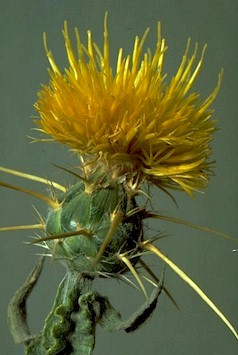Yellow starthistle identification and control
Centaurea solstitalis

Yellow starthistle is a winter annual that is about 12" to 36" tall. It has yellow thistle-like flowers with long, yellowish spines beneath the flower head. The stems and leaves are a dull green and covered with fine woolly hairs. This plant spreads by seed, and each plant can produce 150,000 seeds. This plant is very adaptable and can establish in nearly all semiarid or sub-humid rangeland.
Legal status in King County, Washington
This Class B noxious weed has a limited distribution in western Washington, and control is required in King County. Yellow starthistle is more widespread in eastern Washington, with the largest infestations found in southeast and south central Washington and in the northeastern part of the State. In King County it is occasionally found on I-90 and on Port of Seattle property. For more information on noxious weed regulations and definitions, see Noxious weed lists and laws.
Additional information on yellow starthistle
- Washington State Noxious Weed Control Board (external link)
- Centaurea brochure (316 KB Acrobat file)
What to do if you find this plant in King County, Washington
Please notify us if you see yellow starthistle growing in King County. Our program staff can provide the property owner or appropriate public agency with site-specific advice on how best to remove it. Also, because yellow starthistle is not established in King County, we have an opportunity to stop it from spreading if we act quickly. We map all known locations of regulated noxious weeds such as yellow starthistle in order to help us and others locate new infestations in time to control them.
Report yellow starthistle in King County, Washington
- Please notify us through our online infestation form
Locate yellow starthistle in King County, Washington
- Use our interactive noxious weed map and search
for yellow starthistle
Related information
Related agencies
Program offices are located at 201 S. Jackson St., Suite 600, Seattle, WA 98104. To contact staff, see the Noxious Weed Control Program Directory, send an email, or call 206-477-WEED (206-477-9333).

 Translate
Translate